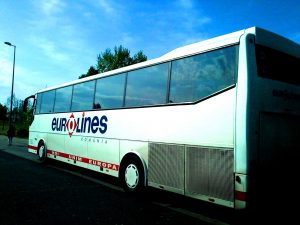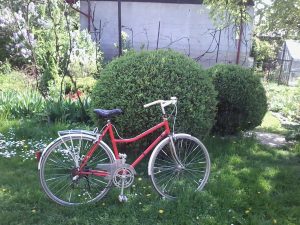On-Arrival Training
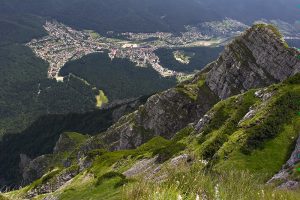 Serviciul European de Voluntariat are mai multe ramuri pe care acționează. Una dintre cele mai importante este cea de învățare. Da, ați înțeles bine, nu doar în școală înveți, ci înveți tot timpul prin orice faci. În cadrul SEV înveți în cel puțin două moduri:
Serviciul European de Voluntariat are mai multe ramuri pe care acționează. Una dintre cele mai importante este cea de învățare. Da, ați înțeles bine, nu doar în școală înveți, ci înveți tot timpul prin orice faci. În cadrul SEV înveți în cel puțin două moduri:
1. experimentând un stil de viață diferit într-o țară diferită și trăind independent.
2. luând parte la o serie de traininguri de educație non-formală care fac parte din Ciclul de Învățare SEV. Și acesta curprinde un Pre-departure Training, un On-Arrival Training, un Mid-Term Evaluation (pentru stagiile mai lungi de 6 luni) și un Post-EVS Meeting la întoarcerea în țară.
Acum vă voi explica pe scurt în ce constă un On-Arrival Training: principalul obiectiv al trainingului este să familiarizeze voluntarii cu țara gazdă, să îi pregătească pentru experiența SEV. OAT ajută voluntarii să facă față provocărilor culturale și de ordin personal. De asemenea îi ajută să se cunoască mai bine și să stabilească legături. Voluntarii primesc și îndrumare pentru a preveni crize și conflicte. Lungimea unui astfel de training este în medie de 5 zile și se desfășoară la începutul stagiului. În România ele sunt organizate de cele mai multe ori într-una din faimoasele stațiuni montane de pe Valea Prahovei.
European Voluntary Service has more ways in works. One of the main ones is the learning dimension. Yeah, you understood well, you don’t learn just in school, you learn no matter what you do. and during EVS you learn in at least two ways:
1. by experimenting a different life style în a different country and living independently.
2. taking part in series of nonformal educational trainings which are part of the Learning Cycle of EVS. This cycle consists of Pre-departure Training, On-Arrival Training, a Mid-Term Evaluation (for stages longer than 6 months) and a Post-EVS Meeting after retunring to the home country.
Now I’ll shortly explain what On-Arrival Training is: the main objective of the on-arrival training is to introduce the volunteers to the host country, preparing them for the service period and the EVS experience. On-arrival training helps the volunteers adapt to cultural and personal challenges. It allows volunteers to get to know each other and to build a network. Volunteers should also receive guidance on conflict prevention and crisis management. The length of such a training is in average 5 days and it is hold in the beginning of the stage. In Romania they are organized most of the times in one of the famous ski resorts from Prahova Valley.
This is all for now, but we’ll keep you updated.
Discovering…
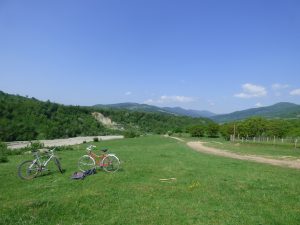 A month passed since Sophie joined the team of Curba de Cultură. In this time she started to discover the surroundings and the people, she had trips, walks and she got invited to festivities. Also the locals had to go through the same process, of getting used to see foreigners, to meet her on the streets and in the schools where she started to go, to do activities with pupils and to show them the usage of learning a foreign language.
A month passed since Sophie joined the team of Curba de Cultură. In this time she started to discover the surroundings and the people, she had trips, walks and she got invited to festivities. Also the locals had to go through the same process, of getting used to see foreigners, to meet her on the streets and in the schools where she started to go, to do activities with pupils and to show them the usage of learning a foreign language.
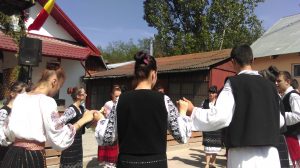 A trecut aproape o lună de când Sophie s-a alăturat echipei Curba de Cultură. În acest timp a explorat împrejurimile și s-a întâlnit cu diverși oameni, a făcut plimbări în natură și a fost invitată la diferite evenimente. În același timp și localnicii au trebuit să treacă prin același proces de adaptare, să se obișnuiască să vadă străini, să o întâlnească pe Sophie pe stradă sau în școlile unde a început să facă activități cu copiii.
A trecut aproape o lună de când Sophie s-a alăturat echipei Curba de Cultură. În acest timp a explorat împrejurimile și s-a întâlnit cu diverși oameni, a făcut plimbări în natură și a fost invitată la diferite evenimente. În același timp și localnicii au trebuit să treacă prin același proces de adaptare, să se obișnuiască să vadă străini, să o întâlnească pe Sophie pe stradă sau în școlile unde a început să facă activități cu copiii.
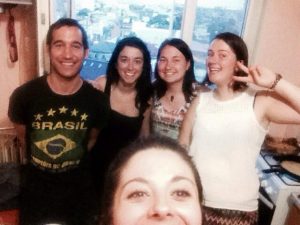 Also Sophie met Anamaria, the mentor who is going to help her get the best from the learning experience of this EVS.
Also Sophie met Anamaria, the mentor who is going to help her get the best from the learning experience of this EVS.
Sophie a întâlnit-o și pe Anamaria, cea care îi va fi mentor pe durata stagiului și care o va ajuta să învețe cât mai mult pe durata acestui stagiu SEV.
Care-i treaba cu SEV-ul?
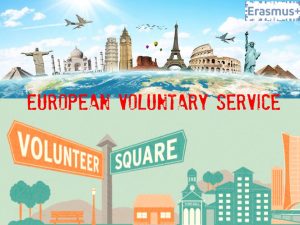 După cum spuneam în articolul anterior Asociația Curba de Cultură a început să găzduiască voluntari SEV (EVS în engleză – European Voluntary Service), iar Sophie este prima voluntară sosită aici la începutul lunii mai. Iar acum mă veți întreba ce înseamnă mai exact SEV.
După cum spuneam în articolul anterior Asociația Curba de Cultură a început să găzduiască voluntari SEV (EVS în engleză – European Voluntary Service), iar Sophie este prima voluntară sosită aici la începutul lunii mai. Iar acum mă veți întreba ce înseamnă mai exact SEV.
Ei bine, Serviciul European de Voluntariat reprezintă cea mai bună și mai la îndemână modalitate pentru tineri de a învăța, ajuta și călători într-o altă țară. De ce e cea mai bună modalitate? Pentru ca vine cu o multitudine de avantaje:
- ai ocazia de a trăi independent și de a vedea cât de bine te descurci
- ai ocazia de a pune în aplicare ideile propriu și primești și ajutor pentru asta
- ai ocazia de a socializa cu oameni pe care altfel nici nu te gândeai că i-ai putea întâlni
- ai ocazia de a învăța în toate modurile posibile, prin ceea ce muncești, prin călătorii pe care le faci, prin oamenii cu care îți petreci timpul și prin simplul fapt de a locui altundeva decât acasă cu părinții.
În plus nu trebuie să plătești cazare, facturi, transport local ori să te îngrijorezi cu ce vei face cumpărături, deoarece toate acestea sunt deja prevăzute în proiect. Ba mai mult primești banii de transport înapoi, ai cursuri pentru limba țării în care vei fi voluntar, ai o asigurare medicală completă și mai primești chiar și niște bani de buzunar.
Ce mai aștepți? Caută acum proiectul care ți se potrivește cel mai bine și aplică!
What about EVS?
EVS (European Voluntary Service) is an international volunteer programme funded by the European Commission. It enables all young people legally resident in Europe, aged between 18 and 30 years, to carry out an international volunteer service in an organisation or in a public body in Europe, Africa, Asia or South America for a period ranging from 2 to 12 months. It is very similar to the International Civil Service: provides the reimbursement of travel expenses (in full, up to specific limitations) and complete coverage of the costs of food and accommodation for the international volunteer.
Thanks to the intercultural dimension and its non-formal approach, European Voluntary Service is a unique opportunity to come into contact with cultures different from your own and to acquire new skills and abilities useful for your personal and professional growth.
European Voluntary Service is based on the following principles:
– increasing your own skills through the practical experience of volunteering abroad;
– encouraging the learning of another language;
– developing the ability to interact with persons of different language and culture;
– spreading tolerance among young people of the European Union;
– promoting active citizenship;
– supporting the development of local communities.
European Voluntary Service is NOT:
– occasional, part-time volunteering;
– an internship in an enterprise, in a humanitary organization or in an NGO;
– a recreational or a tourist activity;
– a language course abroad;
– a paid job.
European Voluntary Service proposes projects in different areas: culture, youth, sports, social care for the elderly, the disabled and the immigrants, cultural heritage, art, leisure, media and communications, environmental protection and education, rural development and development cooperation.
It is possible to do EVS in:
– all 28 European Union Member States;
– EFTA countries (Norway, Iceland and Liechtenstein);
– candidate countries (Turkey, Croatia);
– countries of Eastern Europe and the Caucasus;
– other countries of the world (with different timing and procedures).
European Voluntary Service is practically FREE OF CHARGE!! Travel expenses, accommodation, food, local transportation, health insurance, language lessons and monthly allowance are covered and financed by the European Commission. Volunteers are not even required to pay a fee when applying for an EVS project!
European Voluntary Service is based on a strong partnership between: the sending organization, the host institution and the volunteer.
The sending organization is responsible for the preparation of the volunteer before departure. It informs the candidate about the search procedures of EVS projects, pre-departure training and follows the volunteer at distance throughout his stay abroad and upon his return.
The volunteer will work 5 days out of 7 for a maximum of 40 hours per week and will have 2 days of leave per month (accumulative). He is obliged to participate in pre-departure, on-arrival and mid-term training and must comply with the directives of the host organization performing the tasks specified in the international volunteering project.
During the selection process host organizations cannot require the possession of specific skills or qualifications, only in special cases (duly justified according to the tasks the volunteers are responsible for) it is allowed to select candidates with a specific experience.
E.g. experience in working with children may be required, but not a degree in educational sciences.
Host organizations cannot require volunteers to belong to a specific ethnic or a religious group, nor have a particular sexual orientation or a political opinion.
E.g. it may be required that the volunteer comes from a particular country, such as France, but it is not possible to indicate ethnicity.
The first volunteer is here!
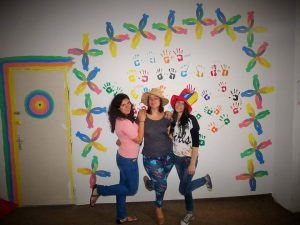 Starting from May 2015 Curba de Cultură is hosting EVS volunteers. This is a great news for us but even a better one for the local community of Izvoarele. People here will have the chance of meeting foreigners, of speaking some words in English and of finding out more about other European countries.
Starting from May 2015 Curba de Cultură is hosting EVS volunteers. This is a great news for us but even a better one for the local community of Izvoarele. People here will have the chance of meeting foreigners, of speaking some words in English and of finding out more about other European countries.
Începând cu luna mai 2015 Curba de Cultură găzduiește voluntari SEV. Aceasta este o veste bună pentru noi și una excelentă pentru comunitatea locală din Izvoarele. locuitorii comunei vor avea ocazia de a întâlni străini, de a vorbi în engleză și de a afla mai multe despre celelalte țări europene.
Sophie France is our first volunteer here, she arrived after a long trip by bus from France and after getting used to the place and getting used to speaking only in English she’ll start the work. She seems happy to be here and excited to discover rural Romania, which is way different from rural France.
Sophie France este primul nostru voluntar aici. Ea a venit din Franța după o lungă călătorie cu autobuzul. După ce se va mai obișnui puțin cu locul și cu faptul că trebuie să vorbească doar în Engleză, ea va începe munca. Este foarte încântată să fie aici și dornică să descopere România rurală, care este cu mult mai diferită de Franța rurală.
Here you have some pictures taken by her. Iar aici aveți câteva dintre pozele ei: 